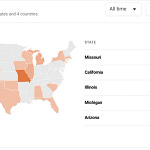Here is an excerpt from the dispatch from The Embassy - Show Me Something Real …
Phillip Hancock was on death row at the Oklahoma State Penitentiary. He was convicted of two murders committed in 2001, resulting in a penalty of death. Devin Moss was his chaplain, or spiritual advisor as Moss described it. Moss had spent much of the prior year conversing with Hancock leading up to the night of the scheduled execution, November 30, 2023. This scenario is not uncommon, at least as it relates to inmates on death row. It isn’t terribly unusual that Hancock professed to be an atheist, although inmates on death row who already have some religious belief or those not already religious finding some belief is more common. What was more unusual here is that Moss is also an atheist.
Devin Moss, like Hancock, grew up a Christian but later rejected belief in God. Moss became an atheist and a chaplain, and counseled Hancock as he faced execution.
There is an adage that says there are no atheists in foxholes — even skeptics will pray when facing death. But Hancock, in the time leading up to his execution, only became more insistent about his nonbelief. He and his chaplain were both confident that there was no God who might grant last-minute salvation, if only they produced a desperate prayer. They had only one another.
An Atheist Chaplain and a Death Row Inmate’s Final Hours - Emma Goldberg - NYT
Both men shared a familiar path to unbelief. Both grew up in homes where Christianity was at least nominally practiced. After entering prison, Hancock was at least considering a Christian faith. But all of the hardships of his life finally turned him away from a belief in God.
Over his early years in prison, Hancock had come to feel abandoned by God.
Then, in 2007, a court denied the appeal of his death sentence. Hancock had a revelation: “I decided, it makes more sense to me to hate a God that does not exist than to be slave to one,” he said.
What did Moss have to offer Hancock in a relationship where neither believed in anything beyond themselves? The answer to that question may have something to say to those of us who profess Christianity and who find the root of answers to ultimate questions in that faith. …
I’d love for you to read the whole piece on The Embassy












Share this post